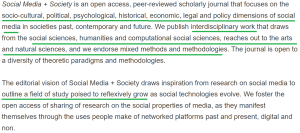As a graduate student, you might feel pressure to publish your work in an academic journal ASAP. Sometimes this pressure will turn into a compulsion to aim for the top journal in your field–you may have heard particularly cantankerous faculty members in your department (they are in every department) claim that publishing in “low quality” journals signals you as a “low quality” scholar. This sentiment is never elaborated on, only joked about in hushed whispers, usually as a way to vaguely intimidate you to be better than some person that your faculty member keeps in contact with as a warning to themselves. Alternately, this pressure can turn into a drive to publish your work in any journal that could plausibly accept it. Going down this road has its own problems, as scholars will often encounter grifty pay-to-play schemes and publications that can render their work so decontextualized or outright hidden that it might as well not be published at all.
There are other worlds than this.
When you start to think about publishing your work, the decision of where to aim might seem like an ancillary concern. However, taking some time to imagine options that don’t jump out at you immediately can actually make your work better. The decision about where to submit your work isn’t just about publication; it is also about how you have to frame your research, how you imagine your audience, what argument you actually want to make, and the ways that you can convince people that your work matters at all. There isn’t an easy way to do this. Journals are parochial, what seems “publishable” is often a matter of social as well as academic context, and sometimes you just get unlucky. But let’s bracket all that and establish a workable set of guidelines.
What conversation is your work contributing to?
Maybe not obviously, there are lots of different kinds of journals, and they overlap with each other (in terms of focus, readership, prestige, schedule, format, etc.) in lots of different ways. If you are looking for a home for your work, though, many of those differences are probably a bit precious. Instead of finding a perfect fit right off the bat, it is probably more valuable to consider what conversation your work is contributing to and what journals are also interested in contributing to that conversation. Though this is an oversimplification, let’s pretend that there are three major ways that journals try to contribute to an academic conversation.
Disciplinary/Field Journals
Some journals assume the interests of an entire academic discipline:
Even without cracking a volume open, I know that these three journals are interested in furthering the advancement of the fields of communication studies, religion, and political science, respectively. Oftentimes, when a journal announces itself as the “flagship journal” of a major academic guild, it is signaling a broad interest in anything produced by and within that guild’s field (for background, I used to work for the Journal of the American Academy of Religion).
Apart from the title, one way to get a sense of what journals want (disciplinary journals as well as other kinds) is to take a look at what the editor says about the journal and it’s goals. Most journals will have something akin to an “About” page, along with a set of “Author Guidelines.” Let’s use the Journal of Communication as an example and see what it says about itself across those two pages:


More than anything else, this journal wants to emphasize its breadth, both in terms of the material that it publishes as well as its intended readership. It wants to be the first place that someone interested in the most current communication capital-D Discourse will turn to. This means that it welcomes original contributions (i.e. not literature reviews) and that those contributions can be theoretical or empirical in nature.
Topical/Subject Focused Journals
Other journals are concerned with the study of a specific subject (or sometimes the study of a specific topic within a specific field):
- Social Media + Society
- The Journal of Religion and Popular Culture
- Intelligent Transportation Infrastructure
While disciplinary journals may have special issues that cover specific topics, their main goal is to publish work that represents the field as a whole. Topical journals, on the other hand, focus exclusively on the application of academic knowledge and methodology to understanding a specific facet of society (from the above examples: social media, religion and popular culture, and AI/transportation).
You can think of these journals as the inverse of the disciplinary journals. While field-focused journals invite scholarship within a field on any and all topics, subject-focused journals invite scholarship from a wide variety of fields on a specific topic: e.g. while the Journal of Communication might be interested in publishing some of the same material as Social Media + Society, not all of what SM+S publishes would be suitable, because some of it might fall outside the purview of what is generally accepted under the umbrella of “communication studies.” Here’s what Social Media + Society has to say about itself:

Beyond just implying that it has a broad disciplinary focus, SM+S actually lists out a wide variety of different disciplines that it solicits work from. The editors also describe wanting to outline a new field of study–you can imagine a college having a “Social Media Studies” department or program (I’m sure some already do). In this way, topical journals and disciplinary journals are doing something similar: both want to define the bounds of a field of study; the difference is that disciplinary journals are continuing to define something that is already defined, while topical journals are trying to establish something, sometimes for the first time.
Methodological Journals
Lastly, some journals focus on specific methodologies, over and above specific disciplines or topics:
- Communication Methods, Measures
- Journal of Ethnographic and Qualitative Research
- Methodological Innovations
Whereas the other two kinds of journals focus on academic contributions to a particular field (disciplinary journals) or a particular subject (topical journals), methodological journals are interested in conversations about how evidence and data is gathered and interpreted, often regardless of discipline or topic. Methodological Innovations explains its focus well:

By calling itself a “forum for methodological advances and debates,” this journal is highlighting its concern for the ways that arguments are made and supported within different disciplines over and above the specific content of those arguments. This means that these journals will often display a wide diversity of scholarship, focusing on different topics and coming from different parts of the university. Some methodological journals are mostly concerned with one method/tool (e.g. the Journal of Ethnographic and Qualitative Research) while others might care about the methodological tools of one discipline in particular (e.g. Communication Methods, Measures).
What to do with this
Although some research papers/articles lend themselves better to one type of journal over others, it is important to remember that nothing about your research is inevitable. You chose your research question, and in doing so you chose a huge number of research questions not to ask. You chose the methodology that you would use to answer your research question (same deal). And you chose to highlight the significance of your research how you did–it is likely that your research is important for many reasons.
Choosing which journal to submit your work to, then, is tantamount to imagining several different versions of the research story that you want to tell. Just like with stories you tell your friends or family, there isn’t any “right” way to do it–it is just important to tell the story that you want to tell. So, with that, here are some questions to ask yourself as you consider whether you should aim for publication in a disciplinary, topical, or methodological journal.
What kinds of conversations is your research contributing to?
- Does it help practitioners of a field/discipline better understand the value/limitations of that field/discipline?
- Will it help readers from a variety of disciplines better understand a specific topic?
- Are you trying to further the ways that something is studied?
Who do you imagine your audience to be?
- Members of a particular discipline?
- Academics or professionals who are interested in a particular topic?
- People who use a particular tool of study?
What is the significance of your research?
- It helps answer some dominant/long-standing question in your field of study.
- It will help to develop the knowledge surrounding an understudied topic.
- It gives future researchers a better understanding of how they should study a topic.
These, of course, aren’t the only things you can consider when you are looking for place to publish your work. But it is a good start (and probably more useful than only considering a journal’s prestige). Also, for more notes about how to prepare your work for publication, check this out: Adapting Seminar Papers for Conferences or Publication
